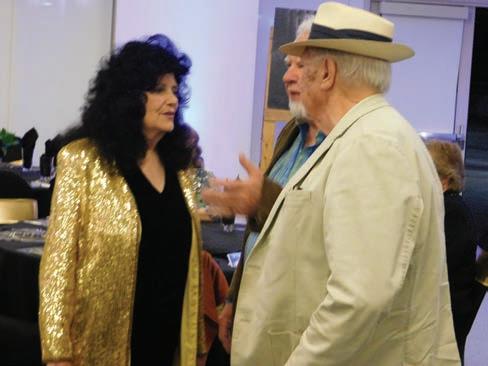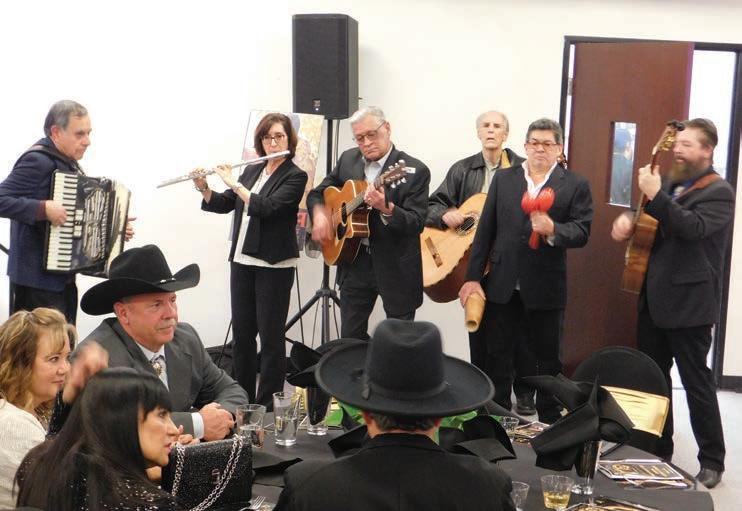
3 minute read
Ramona play President’s Gala celebrates 100 years of national success
Tony Ault Staff Writer
It was a special treat for guests at the 100th anniversary celebration of Ramona, California’s Official Outdoor, with 21 former Ramona and Alessandro actors appearing onstage Jan. 21 at the Hemet Public Library’s banquet room.
Advertisement




Following many awards and certificates from local, state and federal officials to the Ramona Bowl Amphitheatre Board on their 100th year of the outdoor play and the presentation of the past and present lead actors, guests were treated to music from the Arias Troubadours. The Arias family musicians have played at every Ramona play since it was scripted by playwright Garnet Holme in 1923. Their performance was followed with more entertainment from Kayla Contreras and Eli Santana, this year’s Ramona and Alessandro, and others from former plays. Other Ramonas and see GALA, page B-3
Movie review: ‘A Man Called Otto’
Bob Garver
Special to the Valley News
“A Man Called Otto” has not been a well-marketed film. The strategy of the film’s advertising seems to be: “You know how Tom Hanks usually plays likable/ heroic characters to go along with his reputation for being a nice guy in real life? Come to this movie to get the opposite of that. See his versatility as he complains in a phony-sounding growly voice for 90% of the movie, followed by a heartwarming turnaround so sweet that most of the audience will be making the universal sign for gagging. It’ll be unpleasant until it isn’t.”

First of all, it’s not like Tom Hanks has never gone grouchy before. I can watch everything from “A League of Their Own” to the recent “News of the World” to frankly most of “Toy Story” to see Hanks be grumpy without the movie needing to use it as a selling point. Second, if the film needs to draw that much attention to its unpleasantness, I don’t want to see it. I didn’t want to see “A Man Called Otto,” and would not have gone to see it had it not earned enough money to warrant a review. Fortunately the film worked better in one large dose than it did in several smaller ones.
Yes, Hanks’ Otto Anderson spends most of the first act complaining. He complains that rope at the hardware store is sold by the yard and not by the foot. He complains that his neighbors don’t obey simple parking and driving rules in his housing complex. He complains about a stray cat that won’t leave him alone. He complains about his job forcing him to retire. He complains about a real estate company trying to force everyone out of their homes. He complains that America is dying. He’s planning to beat it to the punch, hence the need for the five feet of rope…
Otto’s plans keep getting interrupted, usually by neighbors who need him for something. He’s handy with tools and usually willing to do a favor if it means there will be order in the world. The film never delves deeply into his mental health, though he is definitely suffering from depression following the passing of his wife and probably has OCD or something close to it. It does dwell on his physical health – namely a heart condition called hypertrophic cardiomyopathy. I’ve heard the term before, and I had to grit my teeth every time it came up because I knew that its definition would eventually be treated as a punchline. I was right, and it was just as painful as
I imagined.
The ads do get the bare bones of the story and tone right, but what they don’t show is that the movie is very good at showing “why” Otto acts this way. Sometimes his complaints are completely justified, like when he gets into a fight with an antagonistic clown. Otto keeps his temper in check longer than I would have. Sometimes they’re understandable because of things that have happened in Otto’s past. For these scenes, the film brings in Hanks’ son Truman to play a younger version of Otto. These flashbacks may interrupt the flow of the present-day story, but the movie wouldn’t work without them.
“A Man Called Otto” ultimately works because the character is more fleshed-out than the advertising makes it seem. It shouldn’t be surprising given that the role attracted an actor the caliber of Hanks, but things weren’t looking promising at first. As for the character’s grating voice and mannerisms, they’re initially jarring, but you’ll barely notice them after a while. Broad characters like Otto thrive better in two-hour movies where audiences can warm up to them than in spaced-out trailers and commercials where they can be jarring every time. Just like Otto himself, the performance and the movie require some patience, but they shouldn’t be written off.
Grade: B-
“A Man Called Otto” is rated PG-13 for mature thematic mate- rial involving suicide attempts and language. Its running time is 126 minutes.
Contact Bob Garver at rrg251@ nyu.edu.






